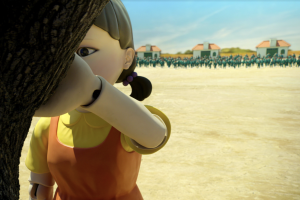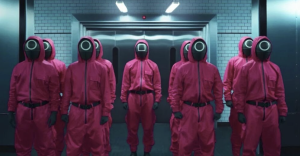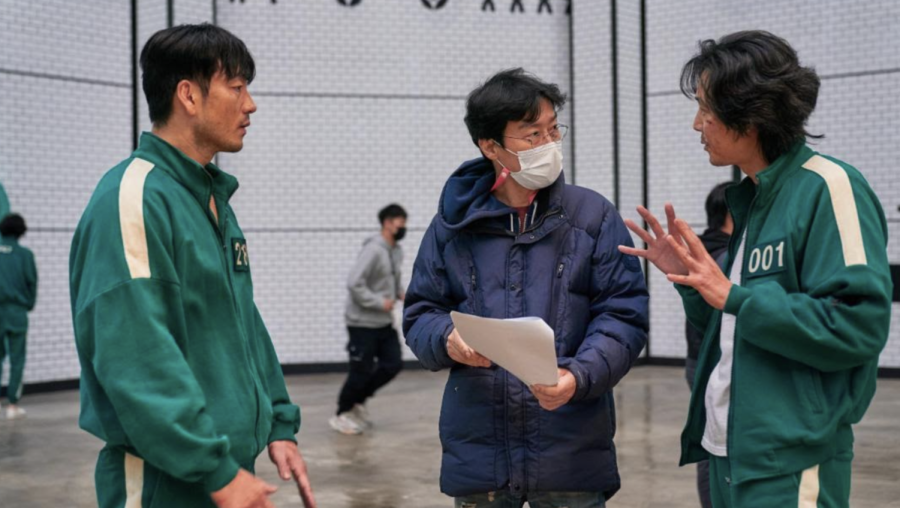The Game that Never Ends
Writer and director, Hwang Dong-hyuk converses with main characters, Seong Gi-hun and Cho Sang-Woo. Photo by Netflix.
February 9, 2022
As the sea of participants crowded the crudely fashioned “playground” clothed in emerald green, they had no idea how few of them would survive the red light of the seemingly benign (but ultimately deadly) gigantic doll. So begins the first round of competition for “Squid Game.”
It’s likely no one would even have seen this gem of a show if the world hadn’t been engaged in a multi-year lockdown. From South Korea to countries far beyond its borders, this Netflix series took viewers around the globe by storm. An intense but intriguing plot filled with twists and turns, violence and profound characters, “Squid Game” became Netflix’s number one show of all time, reaching a total of 1.65 billion hours streamed in the first four weeks, according to Variety. But don’t let those numbers fool you—believe it or not, the “Squid Game” creator did not have an easy time getting his work into production.
According to the Hollywood Reporter, writer and director Hwang Dong-hyuk began working on his creation back in 2008; at that time, he was told that his idea was too unrealistic and violent to become commercially viable. He (and his wallet) were devastated when he could not find backers for this project because he had put everything he had into the script.
Ten years later, Netflix had recently become available in South Korea. Seeing a new audience for his passion project, Hwang’s concept took root again and he approached Netflix with the pitch, determined not to be deterred again. His conversations went seemingly well. “The response that I got after 10 years was that it was, in fact, very realistic,” Hwang said. Finally, after getting the green light, his mind raced with ideas for the perfect episodes to air.

Seong Gi-Hun, the protagonist, is an imperfect but loving father with a somewhat weak morality who makes poor financial decisions. A divorced man with a young daughter whom he only sees infrequently, he longs to take on the parental role the child can look up to; however, her mother’s new husband possesses resources and confidence he lacks. Not having the opportunity to spend time with his daughter and feeling the burden of a sick mother, Seong Gi-Hun’s life starts to fall apart. He gambles his money away until he wins a huge bet, which gives him hope for his future. Sadly, soon a group of men (to whom he obviously owes money) jump him and threaten his life if he doesn’t pay them back.
Later that day, A well-dressed man with a briefcase approaches him in an empty train station and asks him a question. He offers to play a game with him, a native South-Korean game that most people have played at some point in their life. If Seong wins the game he receives money, and if he loses, he gets slapped in the face. A door was opening with an opportunity to help pay off his debt. He plays many times, losing every game until he finally wins. Exhausted after getting slapped so many times but ecstatic having won the money he needed so badly, he watches the man with the briefcase leave on a train, but not before giving Seong a card with a phone number on it.
When Gi-hun calls the number on the card, he learns he could make even more money. Uncertain but desperate, he follows the instructions, meets a black van in the middle of the night, and wakes up in a bunk bed wearing a green tracksuit with the number 456 surrounded by 455 other identically dressed contestants. They are kept inside by masked, armed guards in hot pink uniforms. Although the players appear to come from different backgrounds, they share one similar trait: all owe huge financial debts they cannot pay back.
The players are called into a meeting to hear that they will be competing in four different games. The winner of all four games receives money. A large glass bowl soon lowers down from the ceiling quickly filling with South Korean won (in the end, the victor will take home 45.6 billion won, or almost 39 million US dollars). The players are amazed by the cash prize, as all of them are desperate for money. This could be their way out, or so they thought.
The games begin when each of the players are led into the first room, a large room resembling dry land. The first game is called “red light green light.” All of the players were expecting an easy first game, but they were soon mistaken. A giant robot doll/girl stood at the end of the room shouting “red light” and “green light.” When the doll yelled out “GREEN LIGHT” a few people ran ahead laughing at how easy they thought the game was going to be. “RED LIGHT!” The men who all started running tried to stop abruptly, but failed. The doll searched around and then a gunshot was fired. “BOOM!” The man who fails to stop is killed, throwing everyone off guard.
Terrified, everyone runs for the exit gate, machine guns firing all around. Clearly, “red light” means if you move, you die. Many players die at once as very few obey the rules. A total of 255 players die; the rest, traumatized and covered in blood sprayed from the other contestants throughout the game, return to the original room. The game has become serious and now everyone has to turn up a notch.
After the first game, the players learn they can leave with a majority vote; the group casts their ballots, and by a narrow margin the group who chose to return home wins. The players find themselves returned to their previous lives for a short period of time. However, recognizing nothing about their miserable lives have changed, they again call the numbers on the calling cards and return to the game.
The most shocking element of the scenario is their return to the game—they recognized how quickly more than half of them were brutally gunned down in the first competition. Obviously, the other games would likely be just as deadly, but the allure of such a large sum of money that could change their lives forever becomes greater than their fear of death. Most viewers cannot help but put themselves in the players’ situation: would you live a life filled with debt, sadness and despair, or take a chance on almost certain death for just a one in 455 chance to survive and escape poverty?
But the show must go on. Unexpected friendships, betrayal and desperation all become integral thematic elements within the series. The players understand one way they can potentially stay alivis to form alliances and to construct strategies regarding how they will attack the rules for each game put before them. And then there are the VIPs; these mysterious masked figures feature prominently in the episodes and place high-stakes bets on each of the games. Ironically, the masked VIPs bet on the players like horses in a race, which is exactly how Seong lost his own money and ended up in the game himself. Seong becomes less than human, a pawn used for the entertainment of the wealthy.

This show symbolizes how the lives of society’s lower classes have little meaning for the upper classes, and often the lower classes feel totally powerless to change the direction their lives take if they make poor choices. For the super-wealthy, it becomes clear they use money to try and make themselves satisfied and to feel fulfilled. The higher classes become so bored with their extravagant lives that they spend their money watching other humans, living, breathing, souls, being slaughtered right in front of them. It never occurs to them to use their money for the good of humanity. This lesson is one Seong learns at the very end of the series.
When the show opens, Seong’s character is clearly depicted as a flawed man. He ignores his problems and avoids doing the right thing, and these traits start to define him as a son, ex-husband and father. Throughout the game, the audience begins to see other sides of Seong emerge, such as his kindness as he tries to save other players, thinking not just of himself like the rest of the contestants. The audience must question the characters’ morality throughout the series and within each game’s scenario: are there really any “good” people? While some characters possess kind and empathetic traits, others reflect straight-up cold-blooded tendencies. The winner must outlive everyone else; he or she knows any friendships or alliances ultimately will lead to death. Do these facts make them greedy and inhumane or just desperate and pitiful people grasping at a lifeline?
This show is so profound and has so many moments where you will question what you would do if you were placed in a player’s shoes. “Squid Game” appeals to viewers interested in action and are prepared for lots of suspense throughout the show. This entertaining series unpacks new conflicts each episode and leaves the viewer wondering, who will survive next? After watching this action-packed series you may sit down and question yourself, Are you really a good person?
All in all, throughout all of the incredible messages and themes conveyed, this show is just a good watch. All of the twists and turns lead to exciting moments that will have you on the edge of your seat. If you would like to watch a show that will never get boring and that can allow for a change of pace, we highly recommend “Squid Game.” You’ll never look at a childhood game the same way again.



